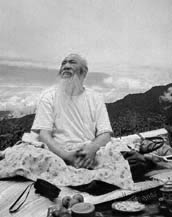|
The
Benefits of Saving the Lives of by
Kyabje Chadral Rinpoche
|
| Glory
be to the Buddha Amitayus (TSEPAMEY, Buddha of Eternal Life) and the numerous
Bodhisattvas!
The unimaginable benefits of such noble deeds are described in different Sutras and Tantras taught by Lord Buddha. The practice of such acts have been recommended by all the Siddhas, both Indian and Tibetan Buddhist pandits in various scriptures. Compassion, being one of the main tenets of the Mahayana, also forms the foundation of the Hinayana sect which sets great store by abstaining from killing, or even harming any living being. The Tantrayana, on the other hand, has one additional facet; it lays great emphasis on maintaining a moral relationship, Samaya, between the saviour and the saved. |
 Photo 2.5: Kyabje Chadral Rinpoche at a picnic |
| Behind all these teachings, there is one single fact of cardinal importance: that on this earth, a human being can commit no greater sin than taking the life of another living being. By implication, there is no bigger source of accumulating merit than saving life. To obtain real peace and happiness in this world, one has simply to follow the path of Ahimsa (non violence), which naturally is common to all the religions of the world. If we do not like to experience any pain or suffering of any kind, how can we expect any other creature, whether big or small, to feel otherwise? There is no better prayer or worship we can offer to the Lord Buddha than by being thoughtful, kind, compassionate and abstaining from taking the life of any fellow human being, animal, bird, fish, or insect. Trying to save any life from imminent danger, or trying to mitigate their pain and suffering, is one more step further in the active practice of loving other living beings. The next logical step, in this regard, is saying prayers for those who die owing to some other persons' thoughtless cruelty. Following this path automatically puts an end to conflicts, or obstacles, if any, within our inner self, generates spontaneous happiness, and bestows absolute inner peace. If your deeds flow from a genuine purity of the heart and are imbued with selflessness, they will enable you to attain enlightenment in the long run. Conscious abstension from hunting and killing living beings, besides inspiring others to do the same, are actions behoving the kind-hearted and pious. For instance, the milk of human kindness requires us not to harm migratory birds in any way, such as casting stones or nets or shooting them while they are resting for brief moments in the course of their long journey from one country or continent to another. On the contrary, we should provide help to them in all possible ways before they reach their final destination. A renowned Buddhist scholar from Bengal, Pandit Atisha Dipankara, said that giving compassionate love to the helpless and the poor is as important as meditating on Shunyata, i.e. Emptiness. This virtue of compassion is the principal foundation stone of the Mahayana Buddhism. |
|
|
| Introduction
of Other Publications | Other
Buddhist Websites | Official
Publication | Colour
Photos |
| Activities Section
| Introduction of
Association | Items
for order | Forms
| Email Us | Home
|